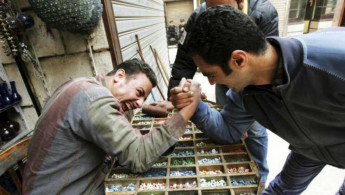Playing the big man: Sexual assault in the Middle East blamed on fragile male egos
This comment was left on Harass Tracker, an online compilation of experiences of sexual attacks in Lebanon's capital city of Beirut. Thousands of similar comments have been posted from all over the country with similar reports found on the Egyptian equivalent HarassMap.
Sexual harassment for all women, across the Middle East, is a real problem. A recent report found that 99.3 percent of all Egyptian women had experienced some form of sexual assault.
In a new report by international research group, Promundo, and UN Women, nearly 10,000 men and women in Egypt, Lebanon, Palestine and Morocco were interviewed to find the reasons behind these shocking statistics.
The main questions in the survey's summary are stark – how is masculinity "affected by political and economic stresses", and "what does it mean to be a man in the MENA in 2017 and beyond?"
"We know quite a lot about women and girls but [relatively little] about men and boys" when it comes to harassment, said Shereen al-Feki, a co-author of the report.
The report, Understanding Masculinities, cannot be accused of generalisation. It found a wide range of problems related to gender equality, each related to specific local and social problems.
"The results of [the survey] cut through the stereotypes and prejudices that too often characterise outside perceptions of men and women in the Arab region."
Yet some gender norms, especially toxic masculinity, appear everywhere – regardless of race and religion.
The authors found that one recurring theme was that young men tried to "perpetuate violence against women or confine them to conventional roles".
 |
The authors found that one recurring theme was that young men tried to perpetuate violence against women or confine them to conventional roles |  |
In short, a culture of targeted violence against women and of blame against women who tried to fight back.
But this is not really news to most women.
An Egyptian salafi preacher claimed on live TV in April that a gang rape victim was to blame for her own attack, because she was "not wearing a hijab".
"Does this girl not deserve some of the blame? She was walking in the street wearing provocative clothing and not wearing a hijab… she was also to blame," Abdel Hamid said.
One of the main reasons given by young men in the survey was 'for fun'.
"When asked why they carried out such violence, the vast majority of men – up to 90 percent in some countries – said they did it for fun," the report reads.
But the reason this report is so important is that it reports on the importance of economic factors on why young men commit these crimes.
"Almost 80 percent of men [in MENA] are the main breadwinners for their family. More than half of men reported frequently feeling stressed due to lack of work, and worried about not being able to meet their family's daily needs."
The report's authors found that this stress led to feeling of emasculation and frustration. Feelings that can be naturally relieved through machismo and playing the big man.
 |
This stress led to feeling of emasculation and frustration. Feelings that can be naturally relieved through machismo and playing the big man |  |
These young men "have high aspirations for themselves and aren't able to meet them," Gary Barker, the second co-author, told NPR.
"So they [harass women] to put them in their place. They feel like the world owes them."
A 2014 study of domestic abuse in Brazil isolated how "macho men" justified their abuse against women by claiming it was a sign of masculinity.
Do you feel disempowered? Do you feel like your masculinity is at risk? Then prove your dominance by lording it over another woman.
Sexually assaulting women is illegal across the Middle East and there are laws that should prevent this kind of behaviour – but they are not being acted on.
Articles 306 (a) and 306 (b) of the Egyptian Penal Code forbid harassment, and perpetrators can expect prison sentences of between six months and five years, in addition to EGP50,000 ($2750) in fines.


